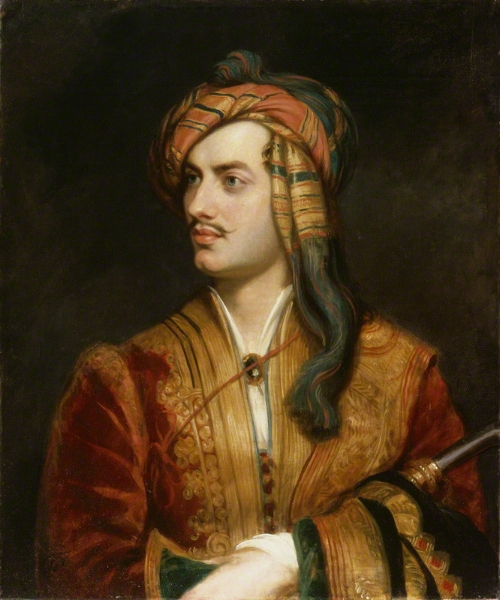Lord Byron and Shelley remained close friends influenced each other's writing, despite their notable and differences in outlook.
“‘See
This lovely child, blithe, innocent and free;
She spends a happy time with little care,
While we to such sick thoughts subjected are
As came on you last night. It is our will
That thus enchains us to permitted ill.
We might be otherwise. We might be all
We dream of happy, high, majestical.
Where is the love, beauty, and truth we seek
But in our mind? and if we were not weak
Should we be less in deed than in desire?’
‘Ay, if we were not weak—and we aspire
How vainly to be strong!’ said Maddalo:
‘You talk Utopia.’ ‘It remains to know,’
I then rejoin'd, ‘and those who try may find
How strong the chains are which our spirit bind;
Brittle perchance as straw…’”
“Julian and Maddalo” is a conversation poem that centres on the relationship between two figures: the aristocratic Maddalo (who resembles Shelley’s friend and fellow poet Lord Byron) and Julian (an idealist who closely resembles Shelley himself). Throughout the poem, the conversations and experiences of the two compatriots touch on subjects that preoccupied both Shelley and Byron in their life and writing. Julian (whose voice begins our excerpt) argues for the mind’s power to change itself and the world around it: “look at your child,” he encourages Maddalo; “there is nothing preventing us from achieving this state of innocent happiness except our own self-imposed agony. Like William Blake, Julian proposes that the chains we wear in our lives are “mind forg’d.” But we “might be otherwise,” he says; “We might be all | we dream of.”
The far more skeptical Maddalo calls this “Utopian”—Julian is being naively idealistic, in other words. Maddalo takes Julian’s rhetorical question—“if we were not weak | Should we be less in deed than in desire?”—and turns it on its head: the problem, he says, is that we are weak, and only “aspire… vainly to be strong.” The will is not free, says Maddalo; rather, our lives are shaped by forces beyond our control.
As is common in debates staged between the two companions throughout the poem, the argument here ends in a stalemate: Julian gets the closing word, but merely says “it remains for us to find out | How strong the chains are which our spirit bind.” In other words, even if Shelley closely resembles Julian in certain ways, his objective in this poem isn’t to demonstrate the superiority of his worldview over that of Byron’s. Neither side is proven correct or incorrect in the poem; rather, Shelley seems far more interested in faithfully exploring competing ways of seeing the world. In fact, Shelley might even be using some of Byron’s ideas to test out the durability of his own convictions: can I be absolutely certain that “we might be all | We dream of”? How do I know? Shelley seems to be asking himself. As we’ve explored elsewhere on Tuesday Verse, this willingness to ask hard questions about his own values and worldview is a recurrent characteristic of Shelley’s scepticism.
This is our "Tuesday Verse" series. Commentary comes from Jonathan Kerr, who has recently completed his PhD in English at the University of Toronto with specialization in the Romantics.
Captions: Thomas Phillips, Lord Byron (1813); Alfred Clint, Percy Shelley (1829)



